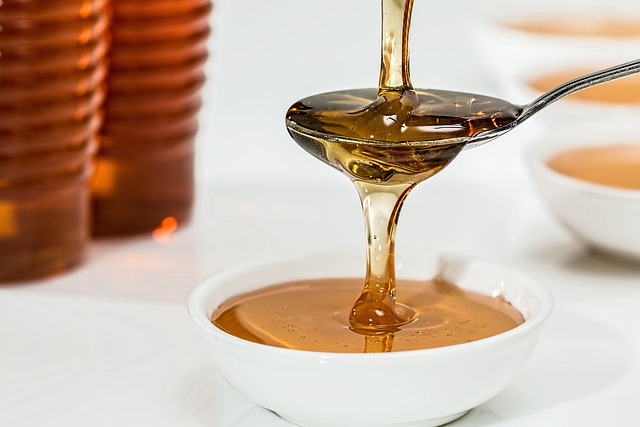
Can Dogs Have Honey? Is Honey Safe for Dogs?
Dog can have honey, but what matters is why, how much, and in what forms.
Dogs are omnivores, which means they enjoy both meat and plants. Their teeth and digestive systems are even designed to chomp and process plant material, too, which is why it’s okay to occasionally give your pup some ‘people food’ such as carrots or apple slices.
Even in modern times, sweeteners like honey are still used most frequently. It’s simple to ignore its therapeutic advantages. It includes a variety of vitamins and minerals, including vitamins A, B, C, D, E, and K, as well as zinc, iron, calcium, potassium, magnesium, manganese, and copper. It has strong antioxidants and antimicrobial, antifungal, and antibacterial properties in its raw form. Your dog can benefit from a variety of these in terms of health.
Let’s explore honey and all the ways it can benefit your dog’s health.
Table of Contents
Is Honey Safe for Dogs?
Dogs can consume honey in moderation without harm. Natural sugars as well as trace amounts of vitamins and minerals are present. Many foods and beverages also use it as a sweetener.
But there is a cost associated with that sweetness. If owners feed their dogs excessive amounts of honey while neglecting to give them enough exercise and a nutritious diet, the high sugar content of honey may cause obesity in the dogs. If you do feed your dog honey, it might be a good idea to brush their teeth as sugars can also contribute to tooth decay.
Due to the possibility of botulism spores present, raw honey should not be given to puppies or dogs with weakened immune systems. Obese or diabetic dogs shouldn’t be given honey.
Are There Benefits to Feeding Dogs Honey?
Honey is said to have antimicrobial and antifungal properties for both humans and canines. It is also said to reduce inflammation, ease stomach ulcers and sore throats, and treat allergies. These claims, however, have not been supported by a significant number of conclusive scientific studies. There are many anecdotal claims made here.
Health Benefits of Honey
The nutrients in honey are in micro-dose form because it contains a lot of sugar and has a high glycemic index. But those nutrients are still present. (Additionally, did you know that properly stored honey never goes bad?)
We are referring to raw, unpasteurized honey when we discuss the health advantages of honey. High fructose corn syrup and other ingredients can be added to heated or processed honey, reducing its therapeutic benefits.
Antioxidants: Honey’s potent antioxidant properties are due to the presence of the vitamins A, C, and E, as well as phenolic acid and flavonoids. They fight off the free radicals that harm your dog’s cells through oxidative stress. They also assist in boosting your dog’s immune system and reducing inflammation.
B-complex vitamins: These constitute the basis of a healthy body. They aid in the metabolism, metabolism, and energy levels of your dog.
Vitamin D & Vitamin E: Both are fat-soluble vitamins that support bone health, control your dog’s immune system, and have properties that help blood clot.
Fat-soluble minerals: Red blood cells and collagen are produced with the help of minerals like copper, magnesium, manganese, and copper. In addition, they support the growth of tendons and ligaments as well as the development of muscles and bone density.
Antimicrobial, and antifungal, and antibacterial properties: The enzymes in honey reduce swelling and relieve sore throats and stomach ulcers. Honey promotes the healing of wounds, hot spots, eczema, and insect bites when applied as a thin layer to skin. When consumed, it assists in clearing the digestive tract of harmful bacteria that may cause diarrhea.
Anti-inflammatory properties: Along with dogs suffering from inflammation brought on by hotspots, wounds, or insect bites, honey can help senior dogs with joint pain.
Seasonal Allergy Relief: Flower pollen is present in honey in traces. The immune system of your dog is stimulated by this pollen, which aids in the development of antibodies that can fend off autoimmune reactions to the pollen.
Quercetin, a polyphenol rich in antihistamines that soothe itchy, watery eyes brought on by environmental allergies, is also found in pollen. The best honey to purchase is local honey because it is more likely to contain this kind of pollen.

How Much Honey Can You Feed Your Dog?
If you want to give your dog honey, ask your veterinarian how much is safe to give them. When it comes to dog treats, less is usually more, especially for smaller breeds. Consult your veterinarian to determine whether honey is safe for your dog to eat if they have a medical condition like diabetes, and think about giving them a treat that contains less sugar, like cucumbers, in place of honey. Examine what common fruits and vegetables dogs can and cannot eat.
Consult your veterinarian for more information about what you can and cannot feed your dog, as well as about natural cures for illnesses.
Dogs Who Should Avoid Eating Honey
Certain pups have health conditions that require close dietary monitoring, so those on the ‘no list’ include:
- Dogs with diabetesor obesity. “Honey should be avoided in diabetic or obese dogs due to its high sugar content,” Follow your veterinarian’s nutritional advice for better snacks, advises Wuellner. (Probably broccoli. Ick.)
- Puppies. According to Wuellner, raw honey may contain botulism spores, a bacteria that produces the botulinum toxin that can cause paralysis, and should not be given to young puppies under two years of age or dogs with weakened immune systems.
- Dogs allergic to bee stings. Bear in mind that dogs rarely exhibit this response. True food allergiesare even more uncommon, and more related to certain proteins, such as eggs. Additionally, BeeAware indicates that a honey allergy is extremely rare, even for humans.
Read about
Honey Can Cause Problems for These Dogs
Dogs who react to bee stings may react to honey as well. If you want to give them honey, start off with one drop per day and increase it from there, keeping an eye out for any allergic reactions.
Puppies’ immune systems are still developing. Due to the possibility of botulism spores, raw honey should not be consumed. It’s possible that those spores will cause the puppy’s digestive problems.
Diabetic dogs should not have honey. Their blood sugar levels might become too high due to the high sugar content.
Overweight or obese dogs don’t need the extra sugar honey contains. There are many additional nutritious snacks readily available. Here are a few suggestions for healthy munchies.
Dogs with compromised immune systems should not eat honey, as it can harbor botulism spores. This group includes canines with diabetes, cancer, lupus, or auto-immune diseases.
Honey can cause tooth decay because of its high sugar content. This risk can be eliminated by weekly tooth brushing for your dog.
Ways to Offer Your Dog This Tasty Superfood
Honey should be given to your dog using a teaspoon for convenience. Just give your dog a spoonful of honey and watch him slurp it up.
Or, if you don’t like the idea of having sticky fingers, try spreading it on some fresh fruit or dog treats.
For a nutritious, refreshing snack on a hot summer day, add a teaspoon of raw honey to your dog’s smoothies made from fresh fruit and vegetables.
To give your dog extra nutrition throughout the day, combine honey and peanut butter, freeze the mixture, and add it to a treat toy.
There are many home-baked treats on the Internet that list raw honey among their ingredients. If you’re trying to sweeten up a treat, raw honey is a great addition, but keep in mind that heating honey destroys its therapeutic properties. To maintain those advantages, try spreading it on the treat’s exterior.
Once you start giving your dog honey, you’ll start thinking of all kinds of inventive ways to include it in their daily diet. Most dogs will gulp down a teaspoon of honey if you add it to their food.
Additional Bee Products for Dogs
According to anecdotal evidence, many pet owners who tried additional bee products for dogs experienced positive outcomes. Although there is no proof that the following products have any real health advantages, you might think about giving them a try for your dog.
Propolis for dogsSometimes called “bee glue,” propolis is a sticky substance that comes from the bark and buds of trees. When the bee lands on the tree, the propolis sticks to their legs; they then take it back to their hives and use it to seal and sanitize. Due to its inherent antibacterial qualities, propolis can be used to treat everything from infections to coughs.
Bee pollen for dogsBees feed their colony with the pollen they carry on their legs. Some people believe that bee pollen can treat a variety of conditions, including allergies and digestive problems.
Beeswax for dogsYou guessed it—bees produce wax, which is what is known as “beeswax.” It can be applied to the skin of dogs to treat ailments brought on by dryness, such as dandruff and cracked paw pads.
Royal jelly for dogsRoyal jelly, a substance that honeybees secrete that resembles milk, may be helpful for your dog if it has a dull coat or hair loss.
What is Honey?
A lot of us only have a basic understanding of honey’s origins—we know it comes from hardworking little bees. Although we already know that bees make honey in their hives by gathering the sweet nectar from flowers, there are still many other fascinating details about how honey is made.
When flowering plants aren’t available, honey is used to feed bees. Honey must therefore be suitable for long-term storage for this reason.
In search of nectar sources, bees fly around. Using their tongues, they collect the sugary liquid from flowering plants and deposit it in their second stomachs, called “crops.” In their crops, the nectar sloshes around and mixes with enzymes that improve its ability to be stored for a long time. The bees then return to their hives with this nectar.
Once at their hives, bees feed their nectar to the worker bees by mouth, who then place it in the honeycomb. The thick, syrupy material we call honey is made when worker bees fan the nectar to evaporate any water or moisture. The comb cells are then sealed for storage with a waxy substance.
For many reasons, the entire process is amazing, and the outcome is incredible. Let’s take a closer look at these causes to discover more about how honey can improve your dog’s health.
Frequently Asked Questions
Can Dogs Eat Raw Honey?
In fact, dogs can consume raw honey. If you’re going to feed your dog honey, stick with raw, local honey or Manuka honey. Avoid honey from the supermarket if it has undergone heat processing or if it contains inferior ingredients like high-fructose corn syrup.
Always consult your veterinarian if you’re unsure whether it’s safe for your dog to eat honey because some dogs have medical conditions that make it unsafe for them to do so.
Can Puppies Have Honey?
If your dog is a puppy or younger than one year old, do not give honey to them as it may contain botulism spores. Don’t start feeding honey to your dog until they are an adult. Even then, you shouldn’t give honey to an adult dog if they have a weakened immune system.




